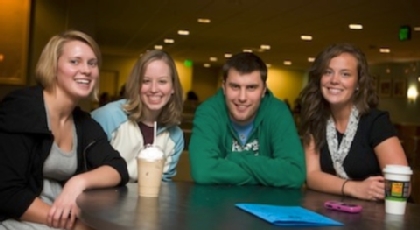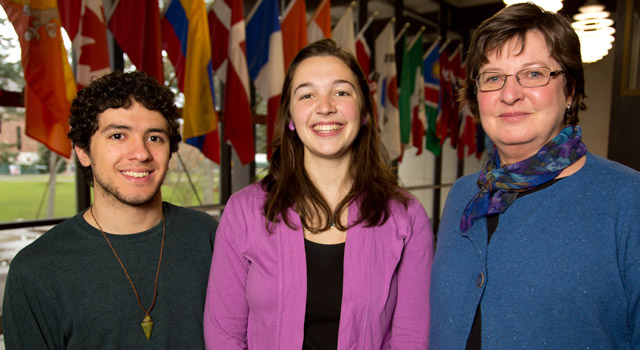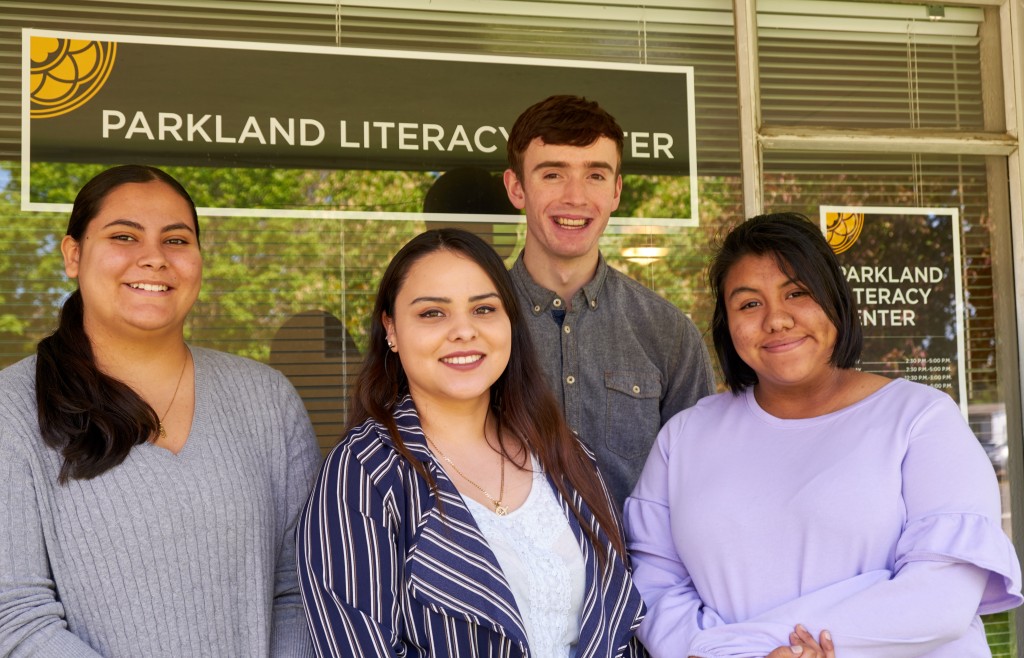Page 82 • (941 results in 0.033 seconds)
-

to see Frosty Westering, so I remember watching many of the games from the sidelines. They were so awesome. And to be actually playing football for the university now is amazing.” A biology major with hopes of becoming an orthopedic surgeon, Brett, 20, said he doesn’t run into his cousins much, unless it’s a chance meeting in the UC while grabbing lunch, as happened last fall during this interview, when Aaron and Kari bumped into him. “If anything, I’d like to see more of them,” he said. Linnea
-
. “One time and I was hooked,” he said. Markuson, like Bendzak, started riding in the fourth grade. He is a student of many interests, and participates in Progress and Biology Club, and holds positions as a Red Carpet Club tour guide and Resident Assistant. Markuson said he is passionate about LUNICYCLERS because there is no ideal club member—everyone is welcome. “We welcome all skill levels,” he said. “It’s like riding a bike, anyone can do it.” Members of the club represent all areas of PLU
-

streamed at 1:30 p.m. in the Scandinavian Cultural Center. Faculty-led discussion will be led by professors Matt Smith (biology) and Gina Hames (history). March 10: Finally on Sunday, Nobel Laureate Tawakkol Karman, a Yemeni journalist will talk about safety and the rights of women and children in Yemen. She will be live streamed at 1:30 p.m. in room 133 of the Anderson University Center. She is the first Arab woman and second Muslim woman to win the Nobel Prize. Faculty-led discussion will be led by
-

Day Lecture is sponsored by the Office of the Provost, Anthropology Department, Associated Students of PLU, Biology Department, Center for Community Engagement & Service, Diversity Center, Economics Department, Environmental Studies Program, Global Studies Program, History Department, Philosophy Department, Residence Hall Association, Women’s Center and Women’s and Gender Studies Program.Earth Day Lecture 2015 What: Dr. Carolyn Finney presents the 2015 Earth Day Lecture, This Patch of Soil: Race
-
experience on and off the field that we’ve come to expect at PLU.” Snyder’s first day on the job will be June 15. Read Previous Q&A with Biology Major Brandon Nguyen ’21 Read Next Teaching in the Pandemic: How Three Teachers Made the Best of an Unprecedented Time COMMENTS*Note: All comments are moderated If the comments don't appear for you, you might have ad blocker enabled or are currently browsing in a "private" window. LATEST POSTS Three students share how scholarships support them in their pursuit
-
two introductory physics series. Students interested in optometry should take the sequence that is required for their intended major. Students majoring in biology usually take the PHYS 125/126 series with accompanying labs, while those majoring in chemistry or physics must take the PHYS 153/154 series with accompanying labs.Mathematics Courses: One semester each of Calculus and Statistics. ExperienceNearly all students who apply to optometry school will have outstanding grades and OAT scores
-
two introductory physics series. Students interested in optometry should take the sequence that is required for their intended major. Students majoring in biology usually take the PHYS 125/126 series with accompanying labs, while those majoring in chemistry or physics must take the PHYS 153/154 series with accompanying labs.Mathematics Courses: One semester each of Calculus and Statistics. ExperienceNearly all students who apply to optometry school will have outstanding grades and OAT scores
-

Biology and Hispanic Studies Major, says, “It’s a great way to give back to the students that walk through our campus every day and may aspire to be in those places that we have the opportunity and privilege to be in. It’s really humbling to get to work with them.”Although the number of students and the type of homework they bring in can be unpredictable, the PLC assistant directors welcome the uncertainty with enthusiasm. Not always knowing what subject or topic they will be working on encourages the
-

Natural Sciences at PLU so that’s biology chemistry physics geosciences computer science math and three to engineering through a day in the life of a natural science student [video: Kyle sits down in a classroom. The bottom of the screen reads “9:00AM”] Kyle: so I normally start off my days with class PLU’s average class size is around 20 students and Natural Science is no exception even our introductory courses are no more than 40 students that means take enough class and rooms like this so I can
-
Publishing and Printing Arts program is an especially valuable complement to majors concerned with language and the written word, majors such as English, other languages, education, public relations, journalism, marketing and graphic design. Students majoring in a wide spectrum of disciplines—from biology to music to religion—have also discovered the value of a PPA minor. It helps to connect them to publishing career opportunities in their field, and provides a richer understanding of the complex roles
Do you have any feedback for us? If so, feel free to use our Feedback Form.


